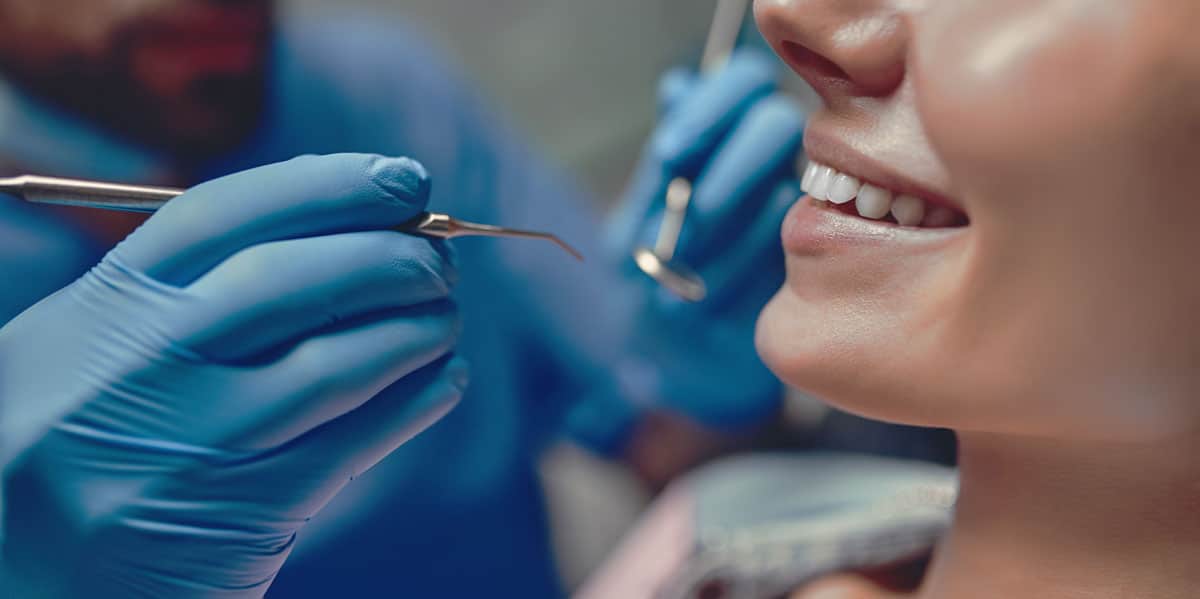How a deep clean at the dentist can improve your oral health

Taking care of your teeth and gums is one of the parts of the puzzle that is overall oral health. Whilst a normal oral care routine of brushing and flossing help, sometimes a routine cleaning isn’t enough to keep your smile healthy. This is where a deep clean at the dentist comes into play. If you’re curious about exactly what this entails, and the benefits it offers, this post is for you.
In this post, we’ll explore the benefits of deep cleaning teeth, when you might need a deep cleaning appointment, and how it can help treat gum disease and prevent tooth loss.
What is a deep clean at the dentist?
A deep clean at the dentist, also known as deep dental cleaning or scaling and root planing, is a professional cleaning treatment designed to remove plaque and tartar build-up from your teeth and gums.
Unlike a standard cleaning that targets the surface of your teeth, a deep clean goes beneath the gum line to remove bacteria and debris from the teeth roots and gum line.
This process helps in preventing and treating conditions such as gum disease and periodontal disease.
Why is it important for your oral health?
The primary reason to undergo a deep clean at the dentist is to help you maintain healthy teeth and protect your overall oral health.
Regular cleanings help remove plaque, but if tartar builds up beneath the gum line, it can lead to gum inflammation, gum recession, and even tooth loss.
Deep cleaning teeth also helps support gum health and reduce the risk of receding gums.
The benefits of a deep clean
Removal of plaque and tartar
Plaque is a sticky film of bacteria that forms on your teeth. If left to get worse, it hardens and becomes tartar. At this point, it can only be removed by a dental professional.
Scaling and root planing are the processes used to remove plaque and tartar from below the gum line.
Left untreated, tartar can lead to gum disease and tooth loss, which is why regular deep cleaning is essential to maintain a healthy smile.
Prevention of gum disease
Gum disease is caused by the bacteria in plaque and tartar. It ranges from mild gum inflammation to advanced gum disease, known as periodontitis.
By removing harmful bacteria, a dental deep cleaning can help prevent gum disease. It can even reverse early symptoms like bleeding gums and bad breath.
Freshens breath and improves appearance
In addition to improving your oral health, a deep cleaning can leave your mouth feeling fresh and your smile looking brighter.
By removing plaque, tartar, and surface stains, you can enjoy cleaner teeth, fresher breath, and improved aesthetics.
This is especially important for people who suffer from bad breath caused by bacteria lurking beneath the gum line.
The deep cleaning process
Initial examination and X-rays
Before your dentist begins the deep cleaning procedure, they will first conduct an initial examination to assess the condition of your gums and teeth.
X-rays may be taken to identify any underlying issues, such as bone loss or damage to the teeth roots. This step ensures that your treatment plan is personalised and appropriate for your needs.
Scaling: removing plaque and tartar
The first part of the deep cleaning involves scaling, which is the process of removing plaque and tartar build-up from your teeth and gum line.
The dentist will use specialised instruments to carefully scrape away the deposits, preventing further damage to your gums and teeth.
Polishing: making your teeth shine
Once the scaling process is complete, your dentist will proceed to polish your teeth.
This step helps to smooth the surfaces of your teeth, making it harder for plaque and tartar to accumulate in the future. It also gives your smile a polished, clean appearance.
When should you consider a deep clean?
You may need a deep cleaning appointment with the dentist or hygienist if you experience any of the below symptoms:
Bleeding gums: If your gums bleed when you brush or floss, it may indicate gum disease. This is often a sign of inflammation caused by plaque and tartar build-up beneath the gum line.
Gum recession: When your gums start pulling away from your teeth, exposing more of the tooth or even the roots, it can be a sign of advanced gum disease. This recession can lead to increased sensitivity and a higher risk of tooth loss.
Loose teeth: If your teeth feel loose or mobile, it can be due to the weakening of the supporting gum tissues and bone from untreated gum disease. This is a serious sign that requires immediate attention.
Persistent bad breath: Bad breath, or halitosis, that doesn’t go away even after brushing or using mouthwash can be caused by bacteria trapped under the gum line. This is a common symptom of gum disease.
Build-up of plaque and tartar: If you notice a yellowish or brownish build-up on your teeth, it could be tartar (hardened plaque). Tartar can only be removed by a dental professional, and if left untreated, it can lead to gum disease.
If you’re experiencing any of these symptoms, it’s important to schedule a deep cleaning appointment with your dentist to restore your gum health and prevent further complications.
How often should you have one?
While a standard cleaning is typically recommended every six months, your dentist may suggest a deep teeth cleaning if you have advanced gum disease or if your teeth and gums need more attention. In some cases, two or more visits may be necessary to thoroughly treat the condition.
Risks and considerations
Sensitivity after a deep clean
After you have your teeth deep cleaned, it is common to feel some sensitivity in your teeth and gums. This is particularly true if you have receding gums or gum inflammation. Sensitivity should subside within a few days, but if it persists, be sure to follow up with your dental professional for more advice.
Potential discomfort and what to expect
Some people find the deep dental cleaning procedure slightly uncomfortable, especially if local anaesthetic is used to numb the area. However, the process is not typically considered painful. If you’re nervous, don’t hesitate to discuss any concerns with your dentist beforehand.
Fulham Road Dental: professional teeth cleaning for your oral hygiene
At Fulham Road Dental, we offer teeth cleaning to help prevent gum disease and maintain oral health. Our skilled hygienists provide scaling and root planing to remove plaque and tartar below the gum line, improving gum health and preventing issues like tooth loss and gum recession.
Whether you need a routine clean or more intensive treatment, our team is here to ensure your gums stay healthy and your smile remains bright. Schedule your appointment today and take the first step toward lasting oral hygiene.


